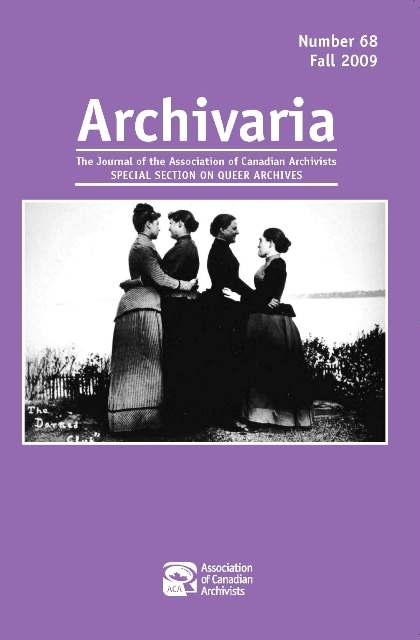Love and Lubrication in the Archives, or rukus!: A Black Queer Archive for the United Kingdom
Abstract
The rukus! archive project was launched in London in June 2005 by photographer Ajamu X, and filmmaker and theatre director Topher Campbell. The archive’s mission is to collect, preserve, exhibit, and otherwise make available for the first time to the public historical, cultural, and artistic materials related to the Black lesbian, gay, bisexual, and transgender communities in the United Kingdom through a variety of activities and events (exhibitions, film-screenings, oral history work, presentations, etc.). The purpose of this article is to introduce the work of rukus! to an international audience, and to highlight its specificities, such as its artist-led nature, its negotiation of the politics of loss and mourning, its intellectual origins in the work of Stuart Hall, and British Cultural Studies more generally, and the critical dialogue it establishes with both mainstream heritage practices and dominant Black and queer identity discourses.
The article takes the form of the edited transcript of an interview that took place between the two cofounders of the archive and Mary Stevens, a researcher at University College London. This unusual format was chosen in order to allow Ajamu and Topher to present their work in their own words and on their own terms. The choice of format also seeks to reflect the idea of the archive as an intensely social practice, part of the process of fostering a shared memory that emerges only through dialogue.
RÉSUMÉ
Le projet d’archives rukus! a été lancé à Londres en juin 2005 par le photographe Ajamu X et le cinéaste et metteur en scène Topher Campbell. La mission des archives est d’acquérir, de préserver, d’exposer et de rendre accessible au public pour la première fois des documents historiques, culturels et artistiques relatifs aux communautés lesbiennes, gaies, bisexuelles et transgenres noires au Royaume-Uni, et ce, par l’entremise d’une variété d’activités et d’événements (expositions, projections de films, travail d’enregistrement d’interviews, communications, etc.). Le but de cet article est de présenter le travail de rukus! à un public international et de mettre en évidence ses spécificités, comme le fait qu’il soit dirigé par des artistes, qu’il soit sensible aux politiques de la mort et du deuil, qu’il trouve ses origines intellectuelles tant dans le travail de Stuart Hall que dans les études culturelles britanniques, et qu’il établit un dialogue entre les pratiques patrimoniales traditionnelles et les discours dominants relatifs à l’identité noire et queer.
L’article présente la transcription révisée d’une interview qui s’est tenue entre les deux co-fondateurs des archives et Mary Stevens, chercheure à la University College London. Ce format original a été choisi afin de permettre à Ajamu et à Topher de présenter leur travail dans leurs propres mots et à leur manière. Le choix du format vise aussi à refléter l’idée que la conception des archives est une pratique intensément sociale et qu’elle fait partie d’un processus de partage de la mémoire qui se concrétise seulement à partir du dialogue.
Authors of manuscripts accepted for publication retain copyright in their work. They are required to sign the Agreement on Authors' Rights and Responsibilities that permits Archivaria to publish and disseminate the work in print and electronically. In the same agreement, authors are required to confirm that "the material submitted for publication in Archivaria, both in its paper and electronic versions, including reproductions of other works (e.g. photographs, maps, etc.) does not infringe upon any existing copyright." Authors of manuscripts accepted for publication retain copyright in their work and are able to publish their articles in institutional repositories or elsewhere as long as the piece is posted after its original appearance on archivaria.ca. Any reproduction within one year following the date of this agreement requires the permission of the General Editor.





